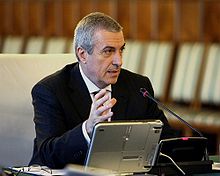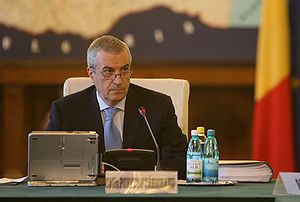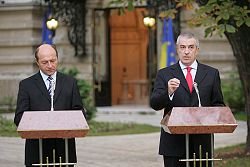- Călin Popescu-Tăriceanu
-
Călin Popescu-Tăriceanu 
60th Prime Minister of Romania In office
29 December 2004 – 22 December 2008President Traian Băsescu
Nicolae VăcăroiuPreceded by Eugen Bejinariu (Acting) Succeeded by Emil Boc Leader of the National Liberal Party in the Chamber of Deputies Incumbent Assumed office
15 December 2008Preceded by Crin Antonescu Minister of Foreign Affairs
ActingIn office
21 March 2007 – 5 April 2007Preceded by Mihai-Răzvan Ungureanu Succeeded by Adrian Cioroianu Minister of Industry and Commerce In office
12 December 1996 – 5 December 1997Prime Minister Victor Ciorbea Preceded by Alexandru Stănescu Succeeded by Mircea Ciumara Constituency Number 42 – Bucharest Personal details Born 14 January 1952
Bucharest, RomaniaPolitical party National Liberal Party Spouse(s) Cornelia Tăriceanu (Divorced)
Livia Tăriceanu (Divorced)
Ioana TăriceanuChildren Călin Popescu-Tăriceanu
Mihai Popescu-TăriceanuAlma mater Technical University of Civil Engineering of Bucharest Profession Constructions engineer Religion Roman Catholicism[citation needed] Website Personal webpage Călin Constantin Anton Popescu-Tăriceanu (Romanian pronunciation: [kəˈlin konstanˈtin anˈton poˈpesku təriˈtʃe̯anu]) (born 14 January 1952) is a Romanian politician. He was the Prime Minister of Romania between 29 December 2004 and 22 December 2008. He is the former president of the National Liberal Party (PNL) and the vice-president of the European Liberal Democrat and Reform Party (ELDR), two positions he assumed in 2004.
Contents
Personal life
Calin Popescu-Tăriceanu was born in Bucharest. His mother, Alexandrina Louise Lăzărescu, is of Greek ancestry[1]–her mother was fully Greek while her father was half-Romanian, half-Greek.[2] He has been married three times and has two children.[3] Popescu-Tăriceanu is a graduate of the Technical Constructions Institute in Bucharest and has a Master's Degree in Mathematics and Computer Science.
Beginnings in politics
Between 1996 and 1997, he served as Minister of Industries and Commerce in Victor Ciorbea's government. Between 1996 and 2004 he was a member of the Chamber of Deputies of Romania, representing Bucharest. Between 2000 and 2004, he was vice president of the PNL group in Parliament, as well as vice president of the Budget, Finances and Insurance Committee in the Chamber of Deputies.[4]
Premiership
Following the victory of Traian Băsescu in the 2004 presidential election, Băsescu appointed Popescu-Tăriceanu as Prime Minister, in line with a pre-electoral agreement between the two parties of the Justice and Truth Alliance. The new government took office on 29 December; it was approved by Parliament by a vote of 265 for and 200 against.
On 7 July 2005, Popescu-Tăriceanu announced that he and his cabinet would resign in order to trigger early elections. The announcement of the resignation was prompted by the Constitutional Court's decision to block a set of laws designed to reform the judicial system. President Traian Băsescu had been pushing for early elections since his victory in the 2004 elections. On 19 July, Popescu-Tăriceanu reversed the decision and announced he would not resign, citing the severe floods that hit the country (for example the Comăneşti floods). Floods killed 66 people in Romania that year, leaving thousands homeless.[5] At that point, relations began to publicly sour between Popescu-Tăriceanu and President Băsescu, who refused to meet with the Prime Minister in the days following the announced reversal.
In the view of former President Emil Constantinescu, however, relations between Popescu-Tăriceanu and President Băsescu started to become strained following allegations of Băsescu's past membership in the Securitate (during Communist Romania).[citation needed]
In September 2005, a newspaper alleged that on 9 April 2004, Tăriceanu bought 10 million shares of the Rompetrol company based on insider information[citation needed], shares that were sold later that year after he became Prime Minister. Several other publicly known persons were cited to testify about their involvement in questionable transactions with Rompetrol shares, including the company's CEO, Dinu Patriciu.
On 5 April 2006 Basescu stated that he regrets naming Tariceanu Prime-Minister, and accused him of partnership with other groups.[6]
On 29 June 2006, Tăriceanu officially announced that the National Liberal Party supports the withdrawal of Romanian troops from international battle zones where they are deployed without a mandate from the United Nations, NATO, or the European Union. This mainly concerns the Romanian troops in Iraq (present there following the Iraq War). This position is strongly opposed by President Băsescu.[citation needed]
On 14 March 2007, Popescu-Tăriceanu postponed the elections for the European Parliament claiming that the political environment was too unstable due to discussions regarding President's impeachment, the subsequent referendum, and the fact that President Basescu asked for a referendum regarding uninominal elections.[citation needed] The media also pointed out that Popescu-Tăriceanu's National Liberal Party stood to perform poorly in the elections if they were held at the time.[citation needed]
On 21 March 2007, he assumed ad interim the office of Minister of Foreign Affairs, 43 days after Ungureanu's resignation, because President Băsescu refused to accept the nomination of Adrian Cioroianu. On 5 April 2007, the Constitutional Court decided "The Romanian President's refusal to name a member of Government at the proposal of Prime Minister started a jurisdictional conflict of a constitutional nature.[...] The Romanian President has no right to veto, but he can ask the Prime Minister to renounce his proposal, if he observes that the proposed person does not meet the legal conditions required to be a member of Government".[7] The same day, Cioroianu assumed the position of Minister of Foreign Affairs.
On 1 April 2007, Tariceanu dismissed the ministers of the pro-Băsescu Democratic Party and formed a minority government with the Democratic Union of Hungarians;[8] the government was approved by Parliament on 3 April, with the support of the Social Democratic Party.[9]
Popescu-Tăriceanu's government survived a no-confidence vote on 3 October 2007, following a motion brought by the Social Democratic Party. Although 220 members of parliament voted in favor of the motion and only 152 voted against it, the motion fell short of the necessary 232 votes.[10]
Controversies
Tăriceanu has been accused by President Băsescu of interfering with justice in Dinu Patriciu's benefit, because prosecutors detained Patriciu for longer than the 24 hours allowed by law.[11]
On 24 January 2006, Monica Macovei, then Minister of Justice, made public a meeting with Tăriceanu which took place 7 months before (in June 2005), and to which Tăriceanu invited Dinu Patriciu. Patriciu complained to Macovei about alleged procedural problems regarding his case. Macovei accused Tăriceanu of interfering with justice. On 20 February 2006 Tăriceanu declared on TVR1:" I recognise my fault. I didn't act correctly. But I didn't influence justice."(Romanian)"Îmi recunosc vina. Nu am procedat corect. Dar nu am influenţat justiţia"[12]
Elena Udrea recalled that, while she was Presidential Counsellor, she saw a note written by Tăriceanu. In a few days President Băsescu found the note and made it public, saying that "The Prime Minister suggested to me a partnership, but, unfortunately, with our oligarchies"(Romanian)"Domnul prim-ministru imi propunea un parteneriat, dar, din pacate, cu oligarhiile noastre". The note was about a complaint from Petromidia about the 27 May procedure problems:
Dear Traian,
1. I send you annexed a document released by Petromidia, regarding the ongoing investigations.
2. If you have the opportunity to speak at the Prosecuting Magistracy about the subject?[13]In May 2007, Patriciu won a lawsuit against Romanian Intelligence Service(SRI), who illegally tapped his phones for two years. He received from SRI 50,000 RON as moral prejudice.[14]
See also
- Călin Popescu-Tăriceanu Cabinet
References
- ^ Press Releases-"The perception about Romania has improved in the last months", have said to the Prime Minister Calin Popescu-Tariceanu the representatives of the Hellenic Association from Romania and those of the Romanian Orthodox Community "Stefan cel Mare si Sfant", that he met to Athena, in the evening
- ^ "Premierul Tariceanu preocupat de romanii emigrati in Grecia", Ziua, 7 July 2005.
- ^ "Morcovul şi Conopida", Kritik.
- ^ Calin Popescu-Tariceanu, Vicepresedinte al Partidului National Liberal, Membru al Camerei Deputatilor
- ^ EurMonitor Guvernare: Inundatii dezastruoase Transparenta Guvernare europeana: Integrare uniunea europeana stiri UE eveniment finantari aderare joburi – EurActiv.ro
- ^ Cotidianul:Basescu: Regret ca l-am numit pe Tariceanu premier
- ^ Antena 3: Comunicat de presa al Curtii constitutionale
- ^ "Romania's prime minister names new Cabinet of minority government", Associated Press (International Herald Tribune), 2 April 2007.
- ^ Adam Brown, "Romanian Lawmakers Approve New Cabinet in First Test of Support", Bloomberg.com, 3 April 2007.
- ^ "Romania's government survives no-confidence motion", Associated Press (International Herald Tribune), 3 October 2007.
- ^ U.S. Department of State:Country Reports on Human Rights Practices – 2005
- ^ Tariceanu despre intalnirea din 2005 cu Macovei si Patriciu: Nu am procedat corect – Realitatea TV – Politică
- ^ HotNews.ro – Basescu dezvaluie continutul biletelului trimis de Tariceanu
- ^ BBC:Dinu Patriciu câştigă procesul împotriva SRI
Bibliography
- Evenimentul Zilei, 14 December 2005, "Emil Constantinescu a adus documente despre care spune că atestă colaborarea preşedintelui Traian Băsescu cu Securitatea"
- Jurnalul National, 9 February 2006. "Urmează Tăriceanu?"
Political offices Preceded by
Alexandru StănescuMinister of Industry and Commerce
1996–1997Succeeded by
Mircea CiumaraPreceded by
Eugen Bejinariu
ActingPrime Minister of Romania
2004–2008Succeeded by
Emil BocPreceded by
Mihai Răzvan UngureanuMinister of Foreign Affairs
Acting
2007Succeeded by
Adrian CioroianuParty political offices Preceded by
Theodor StolojanPresident of the National Liberal Party
2004–2009Succeeded by
Crin Antonescu
United Principalities
Principality of RomaniaArsache · Cantacuzino · I. G. Ghica · Rosetti-Bălănescu · Papadopol-Calimah · I. Ghica · Mavrogheni · Ştirbei · Ş. Golescu · Teriachiu · Ş. Golescu · N. Golescu · D. Ghica · Kogălniceanu* · Calimachi-Catargiu · A. Golescu · Carp · Calimachi-Catargiu · Costa-Foru · Boerescu · Ion Bălăceanu · Cornea · Kogălniceanu · Ionescu · Câmpineanu* · Kogălniceanu · Câmpineanu · BoerescuKingdom of Romania Boerescu · D. Brătianu · Stătescu · Sturdza · Câmpineanu · Ion C. Brătianu* · Pherekyde · Carp · A. Lahovary · Esarcu · A. Lahovary · Sturdza · Stoicescu · Aurelian* · Sturdza · Ioan Lahovary · Marghiloman · Sturdza · Ion I. C. Brătianu · Sturdza* · Iacob Lahovary · Ioan Lahovary · Sturdza · Ion I. C. Brătianu · Djuvara · Maiorescu · Porumbaru · Ion I. C. Brătianu · Averescu* · Arion · Coandă · Ion I. C. Brătianu · Văitoianu* · Mişu · Vaida-Voevod · Zamfirescu · Ionescu · Derussi · Duca · Mitilineu · Ştirbey* · Ion I. C. Brătianu · Titulescu · Argetoianu* · Mironescu · Argetoianu* · D. Ghica · Vaida-Voevod · Titulescu · V. Antonescu · Micescu · Tătărescu* · Petrescu-Comnen · Gafencu · Gigurtu · Argetoianu · Manoilescu · M. Sturdza · I. Antonescu* · M. Antonescu · Niculescu-Buzeşti · Vişoianu · Tătărescu · PaukerCommunist Romania Romania since 1989 * denotes interimI. C. Brătianu • Dimitrie Brătianu • Sturdza • I. I. C. Brătianu • V. Brătianu • Duca • Dinu Brătianu • party abolished, 1948-1990 • Câmpeanu • Ionescu-Quintus • Stoica • Stolojan • Popescu-Tăriceanu • AntonescuPrime Minister Ministers of State Mircea Ciumara • Ulm Spineanu • Gavril Dejeu • Adrian Severin • Victor Babiuc • Călin Popescu-Tăriceanu • Valeriu Stoica • Alexandru AthanasiuMinisters Valeriu Stoica (Justice) • Victor Babiuc/Constantin Dudu Ionescu (Defense) • Mircea Ciumara/Daniel Dăianu (Finance) • Ion Caramitru (Culture) • Nicolae Noica (Public Works) • Dinu Gavrilescu (Agriculture) • Ştefan Iosif Drăgulescu/Ion Victor Bruckner (Health) •
Adrian Severin/Andrei Pleşu (Foreign Affairs) • Călin Popescu-Tăriceanu/Mircea Ciumara (Industry and Commerce) • Alexandru Athanasiu (Labor) • Sorin Pantiş (Communications) • Ioan Oltean/Sorin Frunzăverde/Romică Tomescu (Environment) • Traian Băsescu/Anton Ionescu (Transport) • Gavril Dejeu (Interior) • Virgil Petrescu/Andrei Marga (Education) • Ulm Spineanu/Ilie Şerbănescu (Reform) • Bujor Bogdan Teodoriu/Horia Ene (Research and Technology) • Mihai-Sorin Stănescu/Crin Antonescu (Youth and Sport) • Bogdan Niculescu-Duvăz/Ioan Mureşan (Relation with Parliament) • Ákos Birtalan (Tourism)Minister-Delegates Alexandru Herlea (European Integration) • Remus Opriş (Local Administration) • Valentin Ionescu (Privatization) • Radu Boroianu/Sorin-Mircea Bottez (Public Information) • György Tokay (National Minorities)Prime Minister Călin Popescu-TăriceanuMinister of State Adriean Videanu/Gheorghe Seculici/Gheorghe Pogea (Co-ordinating the Economic Domain) • George Copos/Bogdan Pascu (Co-ordinating the Buisiness, and Small and Medium Enterprises Domain) • Béla Markó (Co-ordinating Culture, Education, European Integration)Ministers Monica Macovei (Justice) • Ionel Popescu/Sebastian Vlădescu (Public Finance) • Gheorghe Barbu (Labor) • Ene Dinga/Anca Boagiu
(European Integration) • Mihai Răzvan Ungureanu/Călin Popescu-Tăriceanu (Foreign Affairs) • Vasile Blaga (Interior) • Codruţ Şereş/
Varujan Vosganian (Economy) • Teodor Atanasiu/Sorin Frunzăverde (Defense) • Gheorghe Flutur/Dan Motreanu (Agriculture) • Gheorghe Dobre/Radu Berceanu (Transport) • Mircea Miclea/Mihail Hărdău (Education) • Mona Muscă/Adrian Iorgulescu (Culture) • Mircea Cinteză/Eugen Nicolăescu (Health) • Zsolt Nagy (Communications and IT) • Sulfina Barbu (Environment)Ministers Delegate Mihai Voicu/Radu Stroe (General Secretariat of the Government) • Cristian David (International Financing Programs and European Community Acquis) • Sorin Vicol (Control) • Bogdan Olteanu/Mihai Voicu (Relations with Parliament) • László Borbély (Transport) • Iuliu Winkler (Commerce)Prime Minister Călin Popescu-TăriceanuMinister of State Béla Markó (Co-ordinating Culture, Education, European Integration)Ministers Tudor Chiuariu/Teodor Meleşcanu/Cătălin Predoiu (Justice) • Teodor Meleşcanu (Defense) • Adrian Iorgulescu (Culture) • Decebal Traian Remeş/Dacian Cioloş (Agriculture) • Eugen Nicolăescu (Health) • Adrian Cioroianu/Lazăr Comănescu (Foreign Affairs) • Varujan Vosganian (Economy) • Paul Păcuraru/Mariana Câmpeanu (Labor) • Attila Korodi (Environment) • Ludovic Orban (Transport) • Cristian David (Interior) • László Borbély (Regional Development) • Cristian Adomniţei/Anton Anton (Education) • Zsolt Nagy/Iuliu Winkler/Károly Borbély (Communications and IT) • Ovidiu Ioan Silaghi (Small and Medium Enterprises)Minister-Delegate Mihai Voicu (Relation with Parliament)Categories:- Chairpersons of the National Liberal Party (Romania)
- Members of the Chamber of Deputies of Romania
- Prime Ministers of Romania
- Romanian Ministers of Foreign Affairs
- Romanian Roman Catholics
- People from Bucharest
- Romanian people of Greek descent
- 1952 births
- Living people
Wikimedia Foundation. 2010.



